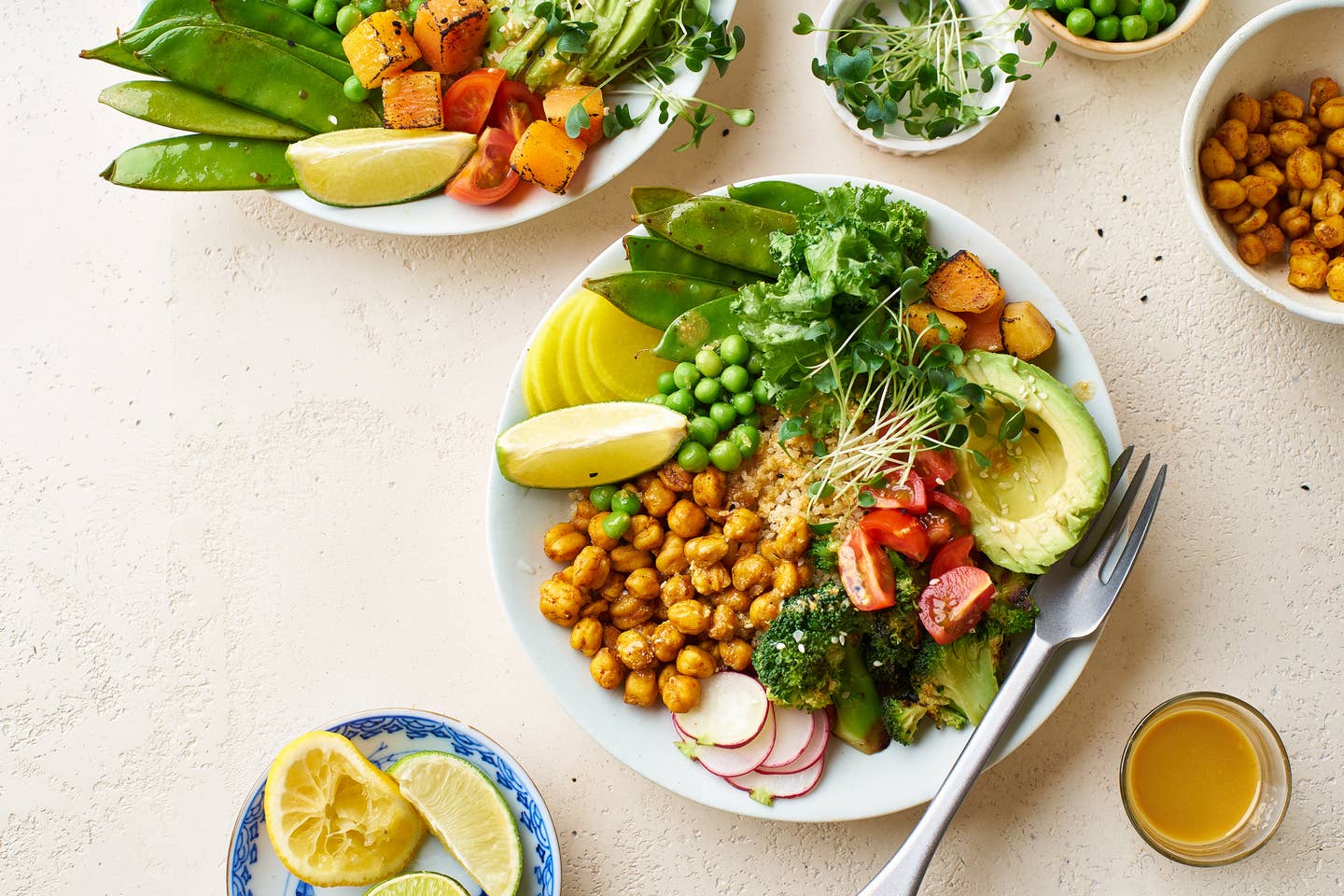
The Best Foods to Eat for Anti-Aging, From Dr. Fred Pescatore
When it comes to aging, everyone spends a lot of time thinking about what to put on their skin and very little attention to what they put into their bodies. That's backward thinking, according to one doctor who has written best-selling books about diet for weight loss, to prevent and help reverse signs of aging and feel and look younger by focusing on a plant-based approach to nourishing your skin. Now is the best time of year, post-sun and outdoors season, to help your skin repair and regenerate, by feeding it the nutrients it needs.
How to nourish your skin with the foods you eat
Here’s what to eat for glowing skin, from D. Freed Pescatore
Lucy: What do you see in your practice? Does diet impact skin health?
Dr. Fred Pescatore: You could botox your skin to death – but if you're unhealthy on the inside then it will still show, and come through and not look right. Lifestyle is critical to our health and wellbeing.
Inflammation or oxidative stress occurs when people eat the wrong foods. So, that's any diet that is high in sugar and refined carbohydrates, and low in fruits, vegetables, and legumes, Unfortunately, it's called the Standard American Diet because that's the way most people eat.
If you are nourishing your body by eating lots of the colors of the rainbow, foods rich in antioxidants, vitamins, and minerals, you're going to create an internal environment that helps your immune system to be healthy, your eyes to look clear, and your skin to look great. You'll reflect that lack of inflammation in every area of your health.
When it comes to eating correctly. It's a choice.
Lucy: My skin clears up when I stop eating so much sugar.
Dr. Pescatore: Yes that happens, and researchers do tons of studies on this. You can take an arterial cell wall and feed sugar to the animal and watch the damage occur when they're fed sugar.
Lucy: What are foods that everyone should eat for anti-aging?
Dr. Pescatore: Macadamia nuts are the first thing that comes to mind because they are high in Omega-9 fatty acids, which means their heart-healthy fatty acids. Diets high in mono and saturated acids like macadamia nuts can boost metabolism, which keeps the engine running. And they're also very satisfying.
It's important to get your vitamins, and macadamia nuts have vitamin E. An assortment of different vitamins is great. I think it's important to put macadamia nuts in your salad, or even your cereal.
Lucy: What are your thoughts on blueberries?
Dr. Pescatore: Blueberries are great, they have a ton of antioxidants and they're a low-sugar fruit. The one thing that worries me in the berry family is the number of pesticides they get sprayed with. Buying organic is great but I always encourage everyone to wash their fruit.
Lucy: What are the other best foods to eat for skin health?
Dr. Pescatore: Fruits that are high in vitamin C, so that is all citrus. Vitamin C helps the body's natural synthesis of collagen, so that helps to repair, any sun damage our skin gets. And can help reduce the appearance of wrinkles and fine lines so that will help you to feel better.
So I think getting citrus is important.
Then, I would suggest pomegranates because they have this compound in them called punicalagin that helps preserve collagen, which also helps keep blood pressure in control, opens arteries, and brings oxygen to the brain, which helps us from getting forgetful.
I would also suggest almonds, pumpkin seeds, or pistachio nuts because they have amazing phytochemicals in them that help heart health, as well as fight diabetes, and prevent aging.
For vegetables, anything in the leafy greens is full of nutrients and good for you. Garlic is also really good because it's prebiotic and the allicin in garlic is good for regulating blood pressure.
Lucy: Do you think exercise plays a role in healthy skin?
Dr. Pescatore: Yes, exercise and nutrition work together. You only need to reduce your systolic blood pressure by three points in order to significantly decrease your risk of dementia, heart attack, and stroke, and you can achieve that just by walking and eating more vegetables. Anything we can do to have a better lifestyle, to eat better, sleep well, exercise – all of these things lead to preventing disease, and less" all-cause" mortality.
Lucy Danziger: So, walking is fine for exercise? No Need to run or do more?
Dr. Pescatore: Walking is key. Everyone thinks walking 10,000 steps a day is the goal, but it's really not. Finally, researchers studied it and it turns out that walking anything more than 4,000 steps a day is actually great. The standard 10,000 steps everyone talks about was made by a Japanese company that sold pedometers.
Lucy Danziger: Ok so we talked about nutrition and exercise. What about stress?
Dr. Pescatore: I think everybody should try to find something that they can do that reduces their stress every day. For me, it's a cycling class. Everyone should find what works for them but they have to do it with consistency. Reducing stress can come from walking your dog, yoga, meditation, or just running up the block.
There's a study that shows the earlier you start working on yourself – like eating correctly, exercising correctly, and being fit – then you're going to have a healthier life for longer. To live your healthiest, start these practices sooner than later.
Lucy: What else should we do for healthy skin?
Dr. Pescatore: Nutritional supplements are so important. I think because people are not getting enough collagen, there are plenty of good vegan supplements, such as plant-based collagen supplements that I've been recommending to people (I really like a brand called Future Kind.)
I highly recommend supplementing with a French maritime pine tree bark extract called Pycnogenol, which is a pine bark extract from France. The trees are remarkable. They're grown in a sustainable forest and they're only from one part of France.
Lucy: Why do you recommend pine bark extract, specifically Pycnogenol?
Dr. Pescatore: This is has been shown to prevent aging in skin. This pine bark extract is what we call a super antioxidant. It's 50 times more powerful than vitamin E, 20 times more powerful than vitamin C, plus it directly works on collagen elastin. What Europeans understand really well is that trees from different regions have different properties, and Pycnogenol comes from one area in France where these trees are grown.
It can help lower blood pressure and lower inflammation and protect skin from UVA damage. It also helps reduce the appearance of fine lines, wrinkles, and dark spots. You can either take it in pill form or use it as a cream. but most of the studies were tested with pills.
Bottom Line: Eat Low-Sugar Whole Foods for Better Skin, Energy, and Health
Dr. Pescatore recommends eating a diet low in sugar, high in nuts, plant-based whole foods such as leafy greens, fruit (especially low in sugar ones such as blueberries), and a wholesome list of macadamia nuts, pomegranate seeds, citrus, almonds, pumpkin seeds, pistachios, leafy greens, and garlic for beautiful, younger-looking skin. If you are going to add a supplement he recommends pycnogenol, a pine bark extract from France with antioxidants.
More From The Beet






